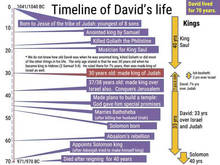
How old was David when he killed Goliath?
This is one of the many events in David’s life which include hints at his age, but no more.
We do not know how old David was when he killed Goliath; the clearest detail we know about his age is in this verse:
“And when the Philistine looked and saw David,
he disdained him, for he was but a youth,
ruddy and handsome in appearance.”
David’s three oldest brothers fought in Saul’s army, but David, the youngest of eight, looked after the family sheep (1 Samuel 17:14-15). This is another hint about his age.
Sometimes we can find extra hints in the original language of a passage. However, the Hebrew word translated “youth” can mean any age from infant to young man, so that’s no help.
This lack of detailed dates or ages is typical and makes it hard to create a timeline of King David’s life.
In all of the many details of David’s life recorded in the Bible, his age is only given once – when he was made king over Judah after the death of King Saul:
“David was thirty years old when he began to reign,
and he reigned forty years.
At Hebron he reigned over Judah seven years and six months,
and at Jerusalem he reigned over all Israel and Judah thirty-three years.”
Since King David was 30 when he became king and reigned 40 years, we can see that he was about 70 when he died.
We are told about many events that happened before he became king, and many that followed his coronation, but we are never given enough information to make us certain exactly when things happened. For example, we do not know how old he was when Solomon was born.
Not only so, but there is evidence that some of the events before he became king are not in chronological order.
“Oh, no!” I hear you say. “This is sounding like the chronology of Jeremiah!”
Relax, it’s not that mixed up!
However, when David was taken to Saul and Abner the commander of the army after he killed Goliath (see 1 Samuel 17), neither of them knew him. Not only so, but the proof David gave of his experience in fighting described fighting lions and bears, not men.
Even when Saul and Abner hear that he is the son of Jesse, no hint of recognition appears, yet in 1 Samuel 16 when Saul is looking for a musician, David the son of Jesse is recommended to him as a man of valour and a man of war.
The simplest explanation of these apparent anachronisms is that the events in chapter 17 happened before those in the last section of chapter 16.
If you wonder how it might fit together, try reading the passages in the order below:
Sometime, I may write another post about the ordering of events in David’s life. For the moment, though, we’ll just observe that some of the recorded events may not be in chronological order.
David’s life was full of unexpected events to which he responded with unusual faith. He fought lions and giants, escaped the flying javelins of a mad king, and safely led a force of hundreds of outlaws through wild areas for several years – even leading them into service under a foreign king. David spent more than a year in the land of the Philistines, and when he left to return to Judah as king, hundreds of foreigners followed him. Later, he conquered the impregnable fortress of Jerusalem and made it his capital. Through his leadership – and despite a moral lapse that earned God’s punishment in the form of family difficulties that dogged the remainder of his reign – David ushered in a time of greatness for the kingdom of Israel that has never been equalled since.
The timeline below shows some of the events of David’s life and you are free to use it as you choose. It is also available in Powerpoint format with embedded fonts – just ask through the Contact Us page.
Many said that David was a mythical figure, until archeologists began to find evidence that he really existed. Read The Tel Dan Inscription: The First Historical Evidence of King David from the Bible.